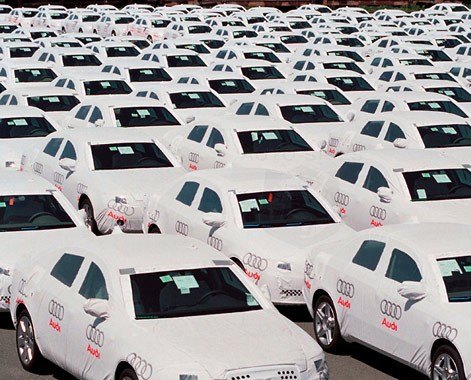Beijing Auto Show: Chinese Luxury Wars Heat Up As German Brands Push Stretch Appeal
As Bertel Schmitt has exhaustively documented, the Chinese luxury car market is hot fire right now. By 2015, luxury sales are expected to quadruple to 2m annually, making China the most important growth market in the world for brands like Audi, BMW and Mercedes. Having landed early, thanks to Volkswagen’s pioneering presence in the Chinese market, Audi is the king of Chinese luxury car brands, and isn’t showing any signs of quitting. And though 77 percent sales growth last quarter is nothing to sneeze at, longer-term trends show Audi’s market share sinking inexorably as its rivals fight hard for a toehold in the lucrative Chinese luxury game. According to BusinessWeek, Audi’s Chinese market share has skidded more than 20 percentage points since 2004, falling from a dominant 66 percent to a mere 42 percent last year. Can BMW and Mercedes continue to make gains? The only certainties are that they will try, and it won’t be easy.
Perhaps the most important lesson learned by Audi in its decades in China is the importance of rear legroom. Rather than selling global models in China, Audi has had the most luck with China-only stretched version of its A6 sedan that initially gained favor as the car of choice for Beijing’s aparatchiks. Exactly why Chinese culture places such an emphasis on large, chauffeured sedans isn’t immediately clear to this laowai, but the reality is undeniable: The A6L made up over half of Audi’s record Q1 sales, while the a more recently-introduced A4L shows signs of catching up.
In hopes of making continued inroads into Audi’s sales, Mercedes and BMW are using this year’s Beijing Auto Show to debut extended-wheelbase versions of their E-Class and 5-Series. The stretched E-Class is almost certain to make it to production, as Daimler tries to pull itself out of third place in both the Chinese and global luxury sales race. The BMW is being shown as an EV concept, jointly developed with Tongji University, and as such won’t be built as the EV it is being shown as. But BMW is quick to emphasize that the LWB 5-Series is headed for production as a “built in China, by China, and for China” model. In the white-hot Chinese luxury market, this is the name of the game.
Audi, meanwhile, already has the stretched E-segment sedan it needs, and is busy expanding its brand upwards to facilitate further growth. Accordingly, it’s major debut in Beijing is a stretched “L” version of its A8 flagship sedan, which will be a global model but is likely to sell more volume in China than any other market. Audi may no longer enjoy the near-monopoly it once had in the Chinese luxury market, but it ain’t going anywhere either.
More by Edward Niedermeyer
Latest Car Reviews
Read moreLatest Product Reviews
Read moreRecent Comments
- Lichtronamo Watch as the non-us based automakers shift more production to Mexico in the future.
- 28-Cars-Later " Electrek recently dug around in Tesla’s online parts catalog and found that the windshield costs a whopping $1,900 to replace.To be fair, that’s around what a Mercedes S-Class or Rivian windshield costs, but the Tesla’s glass is unique because of its shape. It’s also worth noting that most insurance plans have glass replacement options that can make the repair a low- or zero-cost issue. "Now I understand why my insurance is so high despite no claims for years and about 7,500 annual miles between three cars.
- AMcA My theory is that that when the Big 3 gave away the store to the UAW in the last contract, there was a side deal in which the UAW promised to go after the non-organized transplant plants. Even the UAW understands that if the wage differential gets too high it's gonna kill the golden goose.
- MKizzy Why else does range matter? Because in the EV advocate's dream scenario of a post-ICE future, the average multi-car household will find itself with more EVs in their garages and driveways than places to plug them in or the capacity to charge then all at once without significant electrical upgrades. Unless each vehicle has enough range to allow for multiple days without plugging in, fighting over charging access in multi-EV households will be right up there with finances for causes of domestic strife.
- 28-Cars-Later WSJ blurb in Think or Swim:Workers at Volkswagen's Tennessee factory voted to join the United Auto Workers, marking a historic win for the 89- year-old union that is seeking to expand where it has struggled before, with foreign-owned factories in the South.The vote is a breakthrough for the UAW, whose membership has shrunk by about three-quarters since the 1970s, to less than 400,000 workers last year.UAW leaders have hitched their growth ambitions to organizing nonunion auto factories, many of which are in southern states where the Detroit-based labor group has failed several times and antiunion sentiment abounds."People are ready for change," said Kelcey Smith, 48, who has worked in the VW plant's paint shop for about a year, after leaving his job at an Amazon.com warehouse in town. "We look forward to making history and bringing change throughout the entire South." ...Start the clock on a Chattanooga shutdown.






































Comments
Join the conversation
A shrinking share of a growing market is still a good thing. They can't expect to maintain the same share when a flood of new competitors comes into the market. But they can expect to sell MORE units if the total market segment is increasing.